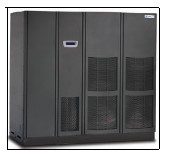
Eaton Corporation's Eaton 9395 uninterruptible
power system (UPS) is the first power quality
product to receive a Sustainable Materials Rating
Technology (SMaRT©) Gold certification. This makes
the 9395 the first UPS certified to contribute to
Leadership in Energy and Environmental Design
(LEED®) points for buildings and projects seeking
LEED certification from the U.S. Green Building
Council (USGBC).
SMaRT is the consensus sustainable product standard
developed and administered by the non-profit Institute
for Market Transformation to Sustainability (MTS).
SMaRT products must offer multiple environmental and
economic benefits such as cost savings, design
innovation, product differentiation, and also meet life
cycle environmental performance requirements.
"Data center
managers, engineers
and architects have
realized the awardwinning
9395 is a smart
choice when it comes to
three-phase power
protection for large
facilities and data
centers due to its
leading energy
efficiency, compact
footprint and customizable design options," said Jim
Davis, director, product management, Eaton Power
Quality and Control Operations. "Eaton's SMaRT Gold
certification is the next step in documenting the green
benefits associated with the production and use of our
UPS. We're proud to offer the first SMaRT certified UPS to
help our customers advance sustainability initiatives."
The SMaRT Gold certified 9395 can contribute to
points in two LEED Credit Categories. For the Innovation
in Design Credit, projects can use SMaRT certified
building materials and products that account for 2.5
percent of the total value of all building materials and
products, based on cost. The 9395 can also contribute
toward the Energy and Atmosphere Credit, which
requires facilities demonstrate a percentage improvement
in the proposed building performance rating compared
with the baseline building performance rating.
The 9395 SMaRT certification resulted largely from
Eaton's commissioned life cycle assessment that
compared everything from the materials used in
manufacturing, to energy used during construction, to
costs associated with transporting the product. The
study results showed that improvements in UPS
efficiency play a significant role in reducing the overall
environmental impact of the product.